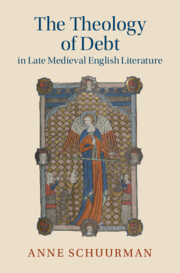Book contents
- The Theology of Debt in Late Medieval English Literature
- Cambridge Studies in Medieval Literature
- The Theology of Debt in Late Medieval English Literature
- Copyright page
- Dedication
- Contents
- Acknowledgements
- Abbreviations
- Introduction
- Chapter 1 Counterfeit Money
- Chapter 2 Secret Debts
- Chapter 3 Home Economics
- Chapter 4 “What is ynogh to mene”
- Chapter 5 Piers Plowman and the Inappropriable
- Epilogue
- Notes
- Bibliography
- Index
- Cambridge Studies in Medieval Literature
Chapter 3 - Home Economics
The Marriage Debt in The Wife of Bath’s Prologue and Tale and The Merchant’s Tale
Published online by Cambridge University Press: 04 January 2024
- The Theology of Debt in Late Medieval English Literature
- Cambridge Studies in Medieval Literature
- The Theology of Debt in Late Medieval English Literature
- Copyright page
- Dedication
- Contents
- Acknowledgements
- Abbreviations
- Introduction
- Chapter 1 Counterfeit Money
- Chapter 2 Secret Debts
- Chapter 3 Home Economics
- Chapter 4 “What is ynogh to mene”
- Chapter 5 Piers Plowman and the Inappropriable
- Epilogue
- Notes
- Bibliography
- Index
- Cambridge Studies in Medieval Literature
Summary
I argue in Chapter 3 that the canon law precept of the marriage debt, which was formulated particularly by Augustine, Gratian, and Thomas Aquinas in the course of establishing marriage as a sacrament, indicates a mode by which power is exercised on and through the bodies and the wills of married parties. It is a mode by which individuals are enjoined to a voluntary subservience. The power that the loathly lady figure wields over the penitent knight in The Wife of Bath’s Tale leaves its subject formally free but freely compliant, aiming at the production of internal conditions rather than external constraints. The same dynamic shapes the plots of other medieval texts featuring the marriage debt, from Chaucer’s The Merchant’s Tale to the tales told on Days 2 and 8 of Boccaccio’s Decameron, all of which I consider as illustrative analogues. These texts identify marriage, and marital sex in particular, as a key site where debt makes subjects, where political power is enacted in and through the free wills of human beings.
- Type
- Chapter
- Information
- The Theology of Debt in Late Medieval English Literature , pp. 82 - 111Publisher: Cambridge University PressPrint publication year: 2024

